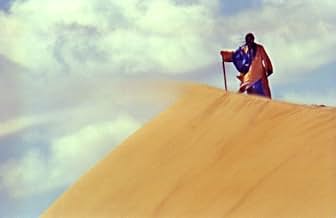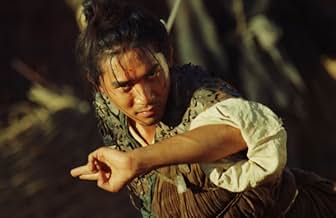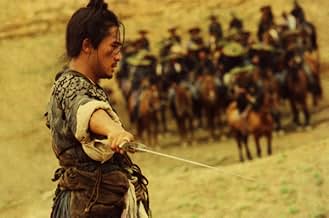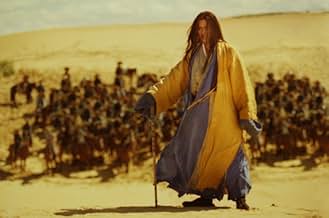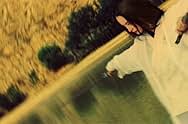VALUTAZIONE IMDb
7,0/10
17.831
LA TUA VALUTAZIONE
Un sicario con il cuore spezzato si trasferisce nel deserto dove trova abili spadaccini per eseguire i suoi omicidi concordati per contratto.Un sicario con il cuore spezzato si trasferisce nel deserto dove trova abili spadaccini per eseguire i suoi omicidi concordati per contratto.Un sicario con il cuore spezzato si trasferisce nel deserto dove trova abili spadaccini per eseguire i suoi omicidi concordati per contratto.
- Premi
- 9 vittorie e 13 candidature totali
Tony Leung Chiu-wai
- Blind Swordsman
- (as Tony Chiu Wai Leung)
Collin Chou
- Swordsman
- (non citato nei titoli originali)
Shun Lau
- Leader of Ouyang's Opponents in Opening Battle
- (non citato nei titoli originali)
Li Yin
- Rebel swordsman
- (non citato nei titoli originali)
Recensioni in evidenza
I have my message headed with a WARNING because I don't want any readers to be misled and go rushing for this movie thinking it's like anyone of those Chinese Wuxia movies. This is not an action based movie, it only has "sword fighting" world as a background. This is what always made WKW's films different from any others'. This film has probably the least action scenes compared to any other sword fighting films made within the last 15 years.
I called it Timeless because seen again today, you don't find it outdated like some others' films. This is among the only 4 Chinese films that I will enjoy watching again every 2 or 3 years and I think this is the most "timeless" among the 4.(The other 3 are Love Eterne(Li Han Hsiang), A Touch of Zen(King Hu) and Days of Being Wild(WKW))
This is the kind of film that you know it's great even if you don't understand it. You don't need to understand its story in order to enjoy it. It's message is simply about "memories" and "regrets". It said something like "Regrets is the most painful feeling" and "regrets and unhappiness because of memories".It's the most complicated among WKW's 7 or 8 films(till 2046 and Eros). I don't fully understand it during the first viewing but I was totally surprised and mesmerized. I am the type that will consider a film good only if after watching, surprised me and felt that i could not thought of such a film. If I can expect or imagine a film's outcome, I will not call it great. Even after 4 viewings now, I am not totally sure I have figured out all its sequences yet but it doesn't matter. Some of the scenes and editions are paced so fast that you may not recall seeing it. Just like his recent 2046. This is the work of a brilliant director,because you need more than 1 viewing to fully get it so you must buy a copy for future viewing. Heard that even the Venice Filmfest Jury has to give it a prize although they don't understand what's it about.
Those who don't know how to appreciate a good film may not understand a WKW film as he seldom stick to a particular genre, his films' genre is simply WKW and it's all about sights and sound in WKW-style. Original, stylish and trend setting. After his Ashes of Time and Fallen Angels swept all the major awards during the HK Film Awards in the same year, 2 most prominent HK directors changed style and tried to follow WKW-style but both failed(Tsui Hark in Dao(Blade) and Stanley Kwan in Hold Me Tight.
WKW has mentioned that movies, to him is most is sights and sound and we see it clearly in this film. The music and the cinematography is the best.
Those who don't like WKW films may criticize that he don't has a script or don't know what he wants until the final edition. I totally disagree. I think WKW always know what he wants and completed the film just the way he wants it, otherwise how could all his films are being so well received by critics ?. As for the viewers, what we want is the finished work. We don't care the original idea or the casts. We only care for the outcome. I mentioned it because this film took 2 years to complete and along the way, plot and actors have changed.
Leslie Cheung - nominated for best acting here but I find him better in 2 other WKW films, Days of Being Wild and Happy Together(WKW won best director at Cannes). Brigitte Lin is superb in a dual character role/s. Tony Leung and Carina Lau are always good(usually and only) in WKW films. Maggie Cheung(unbilled) has her best 2 single take shots(her fans must keep this.) Even pop idol Michelle Yeung who never act well appeared like she acted.
I strongly recommend this film to any film student or critics. Those who like "2046" or Tsui Hark's The Blade will like it. This is not WKW's best but I consider it his most UNIQUE. Like any other WKW movies, it's a collectors' item and a future classic, if not already one.
I called it Timeless because seen again today, you don't find it outdated like some others' films. This is among the only 4 Chinese films that I will enjoy watching again every 2 or 3 years and I think this is the most "timeless" among the 4.(The other 3 are Love Eterne(Li Han Hsiang), A Touch of Zen(King Hu) and Days of Being Wild(WKW))
This is the kind of film that you know it's great even if you don't understand it. You don't need to understand its story in order to enjoy it. It's message is simply about "memories" and "regrets". It said something like "Regrets is the most painful feeling" and "regrets and unhappiness because of memories".It's the most complicated among WKW's 7 or 8 films(till 2046 and Eros). I don't fully understand it during the first viewing but I was totally surprised and mesmerized. I am the type that will consider a film good only if after watching, surprised me and felt that i could not thought of such a film. If I can expect or imagine a film's outcome, I will not call it great. Even after 4 viewings now, I am not totally sure I have figured out all its sequences yet but it doesn't matter. Some of the scenes and editions are paced so fast that you may not recall seeing it. Just like his recent 2046. This is the work of a brilliant director,because you need more than 1 viewing to fully get it so you must buy a copy for future viewing. Heard that even the Venice Filmfest Jury has to give it a prize although they don't understand what's it about.
Those who don't know how to appreciate a good film may not understand a WKW film as he seldom stick to a particular genre, his films' genre is simply WKW and it's all about sights and sound in WKW-style. Original, stylish and trend setting. After his Ashes of Time and Fallen Angels swept all the major awards during the HK Film Awards in the same year, 2 most prominent HK directors changed style and tried to follow WKW-style but both failed(Tsui Hark in Dao(Blade) and Stanley Kwan in Hold Me Tight.
WKW has mentioned that movies, to him is most is sights and sound and we see it clearly in this film. The music and the cinematography is the best.
Those who don't like WKW films may criticize that he don't has a script or don't know what he wants until the final edition. I totally disagree. I think WKW always know what he wants and completed the film just the way he wants it, otherwise how could all his films are being so well received by critics ?. As for the viewers, what we want is the finished work. We don't care the original idea or the casts. We only care for the outcome. I mentioned it because this film took 2 years to complete and along the way, plot and actors have changed.
Leslie Cheung - nominated for best acting here but I find him better in 2 other WKW films, Days of Being Wild and Happy Together(WKW won best director at Cannes). Brigitte Lin is superb in a dual character role/s. Tony Leung and Carina Lau are always good(usually and only) in WKW films. Maggie Cheung(unbilled) has her best 2 single take shots(her fans must keep this.) Even pop idol Michelle Yeung who never act well appeared like she acted.
I strongly recommend this film to any film student or critics. Those who like "2046" or Tsui Hark's The Blade will like it. This is not WKW's best but I consider it his most UNIQUE. Like any other WKW movies, it's a collectors' item and a future classic, if not already one.
10guneo
As a Chinese, I had chance to watch Kar Wai Wong's movies in my childhood. One of them is Dung che sai duk. But at that time, I couldn't even understand any of the actor's lines. Didn't understand why they people fight or cry. Then I fell asleep.
But after many years, when I went to university, when the girl I deep in love with left me to another country. I saw DVD of this film again, alone. And this time I cannot help enjoying it. Every actor's line touched me very very much.
What's behind the mountain? May be another mountain, and another. How wonderful it'd be to forget the past. Everyday would be a new beginning. Isn't that great? What's love? Maybe love is to leave the one you love, to win the one then finally find you have lost everything including yourself.
Now I have my job and new life. Many things have been past for a long time. And this movie, I cannot remember some of the scenes. But sometimes I still recall lots of words they say. When I am alone, when I feel gloomy or a little bit sad, the words will come to my mind with beautiful music and the scene of huge desert.
In this world, something's gonna change, something's not. If you cannot have someone, the only thing you can do is not to forget.
I will never forget.
But after many years, when I went to university, when the girl I deep in love with left me to another country. I saw DVD of this film again, alone. And this time I cannot help enjoying it. Every actor's line touched me very very much.
What's behind the mountain? May be another mountain, and another. How wonderful it'd be to forget the past. Everyday would be a new beginning. Isn't that great? What's love? Maybe love is to leave the one you love, to win the one then finally find you have lost everything including yourself.
Now I have my job and new life. Many things have been past for a long time. And this movie, I cannot remember some of the scenes. But sometimes I still recall lots of words they say. When I am alone, when I feel gloomy or a little bit sad, the words will come to my mind with beautiful music and the scene of huge desert.
In this world, something's gonna change, something's not. If you cannot have someone, the only thing you can do is not to forget.
I will never forget.
This classic ultra-stylized and (in the words of the NYFF blurb) "insanely gorgeous" 1994 martial arts or 'wuxia' film based on the Louis Cha novel 'The Eagle-Shooting Horses' needs no introduction to film fans now, though before Tarantino's release of 'Chungking Exrpess' Americans had to go to Chinatown theaters or rent pirated videotapes to see it; I saw it in Chinatown in a double bill with 'As Tears Go By' (1988). A cinematic icon today, Wong Kar-wai didn't get international recognition till 1997 at Cannes (for 'Happy Together'), and the majority of US art-house viewers didn't notice him till 'In the Mood for Love' (2000). Now ironically since the huge blowout and exhaustion of Wong's epic '2046' (2004), a summing-up of his 60's nostalgia themes and characters, he seems to have reached a point of exhaustion, and his English-language romance 'Blueberry Nights' (2007) was a critical failure. Re-editing 'Ashes of Time' looks like another example of treading water, but it's still great to have it; many have still not seen it, and any films as visually magnificent as Wong's are best seen in theaters. It's also fortunate that all his films can be seen on decent DVD's now with readable subtitles for English speakers, instead of the weird earlier Hong Kong prints with flickering titles in Chinese and peculiar English that disappeared before you could read them. 'Ashes of Time Redux' has the best English subtitles yet both visually and linguistically.
According to Wong, 'Ashes of Time' negatives weren't in very good shape, and a search of various versions led him to a huge warehouse somewhere near San Francisco's Chinatown that contained the entire history of Hong Kong movies. He and his team put together various versions, adding a bit to what we already know, digitally cleaning up the images and "enhancing" some of the color and doing things with the sound, adding a new score and "re-arrangement" by Wu Tong including cello solos by Yo Yo Ma.
Experts will have to comb over all this to explain the differences. The cinematographer Christopher Doyle, who was present at the press screening of the film at the NYFF, doesn't like the enhancing of the color and neither do I. A lot of yellows and oranges are heightened, greenish-turquoise touches are set in, and many of the desert sand landscapes seem to have lost their surface detail. This seems unnecessary and even obtrusive, but it's not enough to spoil the experience. Other images simply look more pristine and clear. Wong wouldn't say what specific changes were made in the editing. He preferred to talk about how he adapted Louis Cha's novel and how this film relates to his oeuvre. Both for him and for Doyle it was an essential milestone. The cast features the late Leslie Cheung, both Tony Leungs (Chiu Wai and Ka Fai) and Jacky Cheung, and has Maggie Cheung as The Woman and martial arts film great Brigitte Lin as Murong Yin and Murong Yang, the sister and brother. Lin, now retired, was responsible for the revival of the genre and is central to this film, though Maggie Cheung is its diva, its dream lover.
Cha's novel is a complicated 4-volume wuxia genre epic, very popular but little known or appreciated in the West. Wong studied it carefully (and made a parody of it called 'Eagle-Shooting Heroes') but then though he says this film unlike all his others had a fixed plan (and thus made for a story full of fatalism), he threw away the story and just took a couple of the main characters and made up another simpler story imagining what the characters' lives were like when they were young. A simpler story. Well. The story has always seemed completely incomprehensible to me but after re-watching 'Redux' it obviously is nonetheless a coherent narrative; it's just intricate and, above all, cyclical. It ends as it begins, with the narrator looking into the camera and repeating the opening lines.
'Ashes of Time' was shot in the desert. Doyle had never done that. The film was long delayed and the shoot was difficult. Doyle knew nothing about martial arts or 'Jianghu,' the parallel universe of martial arts fiction. He was under extreme constraints, having very little artificial light. Nonetheless he produced some of the most beautiful sequences in modern film, because he's a great cinematographer, perhaps the greatest of recent decades, as Wong Kar-Wai is one of the defining contemporary cinematic geniuses.
Wong is notable for his meditative and arresting voice-overs. Here is a sample: "People say that if a sword cuts fast enough, the blood spurting out will emit a sound like a sigh. Who would have guessed that the first time I heard that sound it would be my own blood?" "You gained an egg, but lost a finger. Was it worth it?" There are aphorisms or bits of advice: "Fooling a woman is never as easy as you think." The film is anchored and structured by the Chinese calendar: the Chinese almanac is divided into 24 solar terms and the narrative moves forward selectively through these terms, which contain weather descriptions (naturally) and advice as to what is propitious or unlucky and in what regions and directions. There is also a great deal about oblivion and forgetfulness (which are linked with wine, including a magic wine that eliminates memory). The desert and drinking are visual touchstones throughout as are pairs, opposites, and contrasts; and there is cross-dressing and perhaps bisexual love. The images are full of flickering light. The sword fights, which do not begin until more than half way into the film, are without the acrobatic feats actually performed or digitally faked as in current martial arts films, though they are elaborately staged by the action choreographer Sammo Hung. They are a symphony of fast cutting, closeups, blurs, and slow motion (which Wong intended particularly to express the fatigue of the Blind Swordsman in the film).
According to Wong, 'Ashes of Time' negatives weren't in very good shape, and a search of various versions led him to a huge warehouse somewhere near San Francisco's Chinatown that contained the entire history of Hong Kong movies. He and his team put together various versions, adding a bit to what we already know, digitally cleaning up the images and "enhancing" some of the color and doing things with the sound, adding a new score and "re-arrangement" by Wu Tong including cello solos by Yo Yo Ma.
Experts will have to comb over all this to explain the differences. The cinematographer Christopher Doyle, who was present at the press screening of the film at the NYFF, doesn't like the enhancing of the color and neither do I. A lot of yellows and oranges are heightened, greenish-turquoise touches are set in, and many of the desert sand landscapes seem to have lost their surface detail. This seems unnecessary and even obtrusive, but it's not enough to spoil the experience. Other images simply look more pristine and clear. Wong wouldn't say what specific changes were made in the editing. He preferred to talk about how he adapted Louis Cha's novel and how this film relates to his oeuvre. Both for him and for Doyle it was an essential milestone. The cast features the late Leslie Cheung, both Tony Leungs (Chiu Wai and Ka Fai) and Jacky Cheung, and has Maggie Cheung as The Woman and martial arts film great Brigitte Lin as Murong Yin and Murong Yang, the sister and brother. Lin, now retired, was responsible for the revival of the genre and is central to this film, though Maggie Cheung is its diva, its dream lover.
Cha's novel is a complicated 4-volume wuxia genre epic, very popular but little known or appreciated in the West. Wong studied it carefully (and made a parody of it called 'Eagle-Shooting Heroes') but then though he says this film unlike all his others had a fixed plan (and thus made for a story full of fatalism), he threw away the story and just took a couple of the main characters and made up another simpler story imagining what the characters' lives were like when they were young. A simpler story. Well. The story has always seemed completely incomprehensible to me but after re-watching 'Redux' it obviously is nonetheless a coherent narrative; it's just intricate and, above all, cyclical. It ends as it begins, with the narrator looking into the camera and repeating the opening lines.
'Ashes of Time' was shot in the desert. Doyle had never done that. The film was long delayed and the shoot was difficult. Doyle knew nothing about martial arts or 'Jianghu,' the parallel universe of martial arts fiction. He was under extreme constraints, having very little artificial light. Nonetheless he produced some of the most beautiful sequences in modern film, because he's a great cinematographer, perhaps the greatest of recent decades, as Wong Kar-Wai is one of the defining contemporary cinematic geniuses.
Wong is notable for his meditative and arresting voice-overs. Here is a sample: "People say that if a sword cuts fast enough, the blood spurting out will emit a sound like a sigh. Who would have guessed that the first time I heard that sound it would be my own blood?" "You gained an egg, but lost a finger. Was it worth it?" There are aphorisms or bits of advice: "Fooling a woman is never as easy as you think." The film is anchored and structured by the Chinese calendar: the Chinese almanac is divided into 24 solar terms and the narrative moves forward selectively through these terms, which contain weather descriptions (naturally) and advice as to what is propitious or unlucky and in what regions and directions. There is also a great deal about oblivion and forgetfulness (which are linked with wine, including a magic wine that eliminates memory). The desert and drinking are visual touchstones throughout as are pairs, opposites, and contrasts; and there is cross-dressing and perhaps bisexual love. The images are full of flickering light. The sword fights, which do not begin until more than half way into the film, are without the acrobatic feats actually performed or digitally faked as in current martial arts films, though they are elaborately staged by the action choreographer Sammo Hung. They are a symphony of fast cutting, closeups, blurs, and slow motion (which Wong intended particularly to express the fatigue of the Blind Swordsman in the film).
Kar-Wai is one of the three best directors working today. Many feel this is his best work. Surely it is the greatest leap since his previous, but I find the Mood-2046 pair more important, even lifealtering.
If you come into this expecting a story that unfolds in good order and makes sense, you will be disappointed. The overlapping of layers, the folding of narrative, the merging of images is what we're in for.
There are two famous stories about this. The first is that at some point he quit work, then quickly went off to make "Chunking Express," during which he "found himself" ...
The other story has to do with "Pulp Fiction." Tarantino is a huge borrower of ideas. Having already written a couple "raw" movies that people admire, he stumbled upon Kar-Wai in the midst of making this a long affair. All the clever bits in the structure of "Pulp" are from this, just as surely as all the clever bits in "Star Wars" are from Kurosawa.
What are those bits? Multiple persons in one body. Multiple bodies for one person. Circular storytelling where any part is the beginning. Nested narrative where one story tells another. Characters that imagine and forget each other, bringing them into our world and out.
Death, love, yearning, accident, encounter.
All of this at the beginning of a luscious partnership between Kar-Wai and Christopher Doyle. They are today what Greenaway and Sacha Vierny were: dangerous adventures in cinematic imagination coupled with mastery of cinematic expression.
This takes a few too many chances and you can see precisely where Kar-Wai abandoned it to search for sense. (He always shoots in order of what you see.) But if you are ready for the transcendental thrills of his later work, you might want to start here.
Ted's Evaluation -- 3 of 3: Worth watching.
If you come into this expecting a story that unfolds in good order and makes sense, you will be disappointed. The overlapping of layers, the folding of narrative, the merging of images is what we're in for.
There are two famous stories about this. The first is that at some point he quit work, then quickly went off to make "Chunking Express," during which he "found himself" ...
The other story has to do with "Pulp Fiction." Tarantino is a huge borrower of ideas. Having already written a couple "raw" movies that people admire, he stumbled upon Kar-Wai in the midst of making this a long affair. All the clever bits in the structure of "Pulp" are from this, just as surely as all the clever bits in "Star Wars" are from Kurosawa.
What are those bits? Multiple persons in one body. Multiple bodies for one person. Circular storytelling where any part is the beginning. Nested narrative where one story tells another. Characters that imagine and forget each other, bringing them into our world and out.
Death, love, yearning, accident, encounter.
All of this at the beginning of a luscious partnership between Kar-Wai and Christopher Doyle. They are today what Greenaway and Sacha Vierny were: dangerous adventures in cinematic imagination coupled with mastery of cinematic expression.
This takes a few too many chances and you can see precisely where Kar-Wai abandoned it to search for sense. (He always shoots in order of what you see.) But if you are ready for the transcendental thrills of his later work, you might want to start here.
Ted's Evaluation -- 3 of 3: Worth watching.
"Ashes of Time Redux" is Wong Kar Wai's venture into the martial arts genre. However, energetic action and narrative clarity take a backseat to the visual poetry that contemplates wounded hearts, loneliness and the memories of lost love that cut deeper than any sword. Best appreciated as a sensory experience, "Ashes of Time Redux" unfolds as a series of beautiful yet melancholic images like the soft brush strokes of a Chinese landscape painting. Even the sword fights are shot as swirling, hallucinatory dreamscapes. The haunting desert landscape gorgeously captured in saturated colors by cinematographer Christopher Doyle, a brooding cello score by Yo-Yo Ma and the beauty of the actors (an all-star Hong Kong cast) contribute to a movie experience that both pleases the senses and engages the heart.
Lo sapevi?
- QuizThis film had an exhausting effect on Wong Kar-Wai. While on hiatus during the editing process he wrote and shot Hong Kong Express (1994) to "clear his head".
- Citazioni
Ou-yang Feng: People say, when you can't have what you want, the best you can do is not to forget.
- Versioni alternativeWong Kar-wai revisited the film and created the Redux version which premiered at the Cannes Film Festival 2008. This version has alternative footage and changes in the order of scenes. The Redux version has new opening titles, and the season's fade-ins introducing each chapter are new. It also has a new color-scheme and a new soundtrack. Some scenes from the original version have been deleted, for example the two main character's introduction in the beginning. The overall run time of the Redux version is slightly shorter than the original theatrical version.
- ConnessioniFeatured in Century of Cinema: Naamsaang-neuiseung (1996)
I più visti
Accedi per valutare e creare un elenco di titoli salvati per ottenere consigli personalizzati
Dettagli
- Data di uscita
- Paesi di origine
- Siti ufficiali
- Lingue
- Celebre anche come
- Ashes of Time: Redux
- Luoghi delle riprese
- Aziende produttrici
- Vedi altri crediti dell’azienda su IMDbPro
Botteghino
- Budget
- 40.000.000 HKD (previsto)
- Lordo Stati Uniti e Canada
- 174.273 USD
- Fine settimana di apertura Stati Uniti e Canada
- 21.372 USD
- 12 ott 2008
- Lordo in tutto il mondo
- 2.009.694 USD
Contribuisci a questa pagina
Suggerisci una modifica o aggiungi i contenuti mancanti







